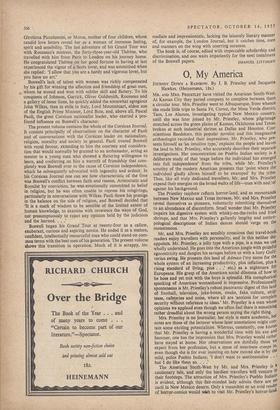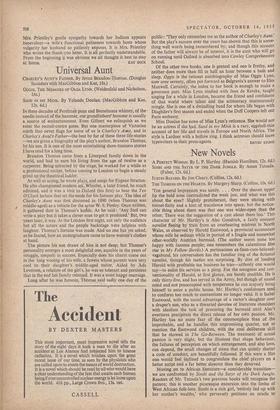0, My America
JOURNEY DOWN A RAINBOW. By J. B. Priestley and Jacquetta Hawkes. (Heinemann, 18s.) MR. AND MRS. PRIESTLEY have visited the American South-West. At Kansas City they parted company to complete between them a circular tour. Mrs. Priestley went to Albuquerque, from whence she made little trips to Santa F6, Cortez, the Mesa Verde district, Taos, Los Alamos, investigating typical New Mexico country, until she was later joined by Mr. Priestley, whose pilgrimage stretched across the green plains of Kansas, Oklahoma and Texas, broken at such industrial shrines as Dallas and Houston. Con- scientious Baedekers, this popular novelist and this imaginative archaeologist recorded their impressions. Mr. Priestley, who pre- sents himself as 'an intuitive type,' explains the people and leaves the land to Mrs. Priestley, who accurately describes their separate investigations. Her concentration on Pueblo Indian society is a deliberate study of that 'stage before the individual has emerged into full independence' from the tribe, while Mr. Priestley's scrutiny of the modern American presents that 'point where the individual gladly allows himself to be swamped' by the tribe. Thus, like all truly dedicated travellers, Mr. and Mrs. PriestleY expend their energies on the broad walks of life—man with and/or against his background.
The Priestley rainbow reflects horror-land, and as memoranda between New Mexico and Texas increase, Mr. and Mrs. Priestley reveal themselves as pioneers, voluntarily submitting themselves to an abundance of discomforts. Small wonder that Mr. PriestleY impairs his digestive system with whisky-on-the-rocks and fried shrimps, and that Mrs. Priestley's gallantly lengthy and anthro- pological descriptions of Indian dances should verge on the monotonous.
Mr, and Mrs. Priestley are sensibly conscious that travel-book readers enjoy travellers with personality, and in this neither dis- appoints. Mr. Priestley, a jolly type with a pipe, is a man we can wholly understand. He goes into the American jungle with prideful egocentricity and dangles his savages before us with a lusty Guth- verian swing. He presents this land of Admass env name for the whole system of an increasing productivity, plus inflation, plus a rising standard of living, plus . . .' etc.) as a nightmare for Europeans. His grasp of the American social dilemma of how to be boss and yet mix with the boys is splendid. His metaphorical spanking of American womanhood is impressive. Professionally spontaneous is Mr. Priestley's robust panoramic digest of this land of football, television, juke-boxes, steaks, fake, culture, strip- tease, cafeterias and noise, where all are `anxiotis for complete security wffhout reference to ideas.' Mr. Priestley is a man whose opinions we applaud even though we often feel there is something rather dreadful about the wrong person saying the right thing. Mrs. Priestley is no journalist; her style is more academic, her notes are those of the lecturer whose later annotations might con- tain some exciting potentialities. Whereas, constantly, one knows that Mr. Priestley is having a wonderful time with his axe and hammer, one has the impression that Mrs. Priestley would rather have stayed at home. Her observations are dutifully those We expect from her profession, but a sense of weariness creeps in, even though she is for ever insisting on how moved she is by the mild, polite Pueblo Indians; 'I don't want to sentimentalise . • but I do like them so. . .
The American South-West by Mr. and Mrs. Priestley is 1 cautionary tale, and only the hardiest travellers will venture in their footsteps. The attraction of Mrs. Priestley's Pueblo Indians is evident, although this fair-minded lady admits there are no cacti in New Mexico deserts. Only a masochist or an avid reader of horror-comics would wish to visit Mr. Priestley's horror-land•
Mrs. Priestley's gentle sympathy towards her Indians appears benevolent—a wife's functional politeness towards hosts whose vulgarity her husband so pitilessly exposes. It is Mrs. Priestley who writes the thank-you letter. It is all perfectly understandable. From the beginning it was obvious we all thought it best to stay











































 Previous page
Previous page